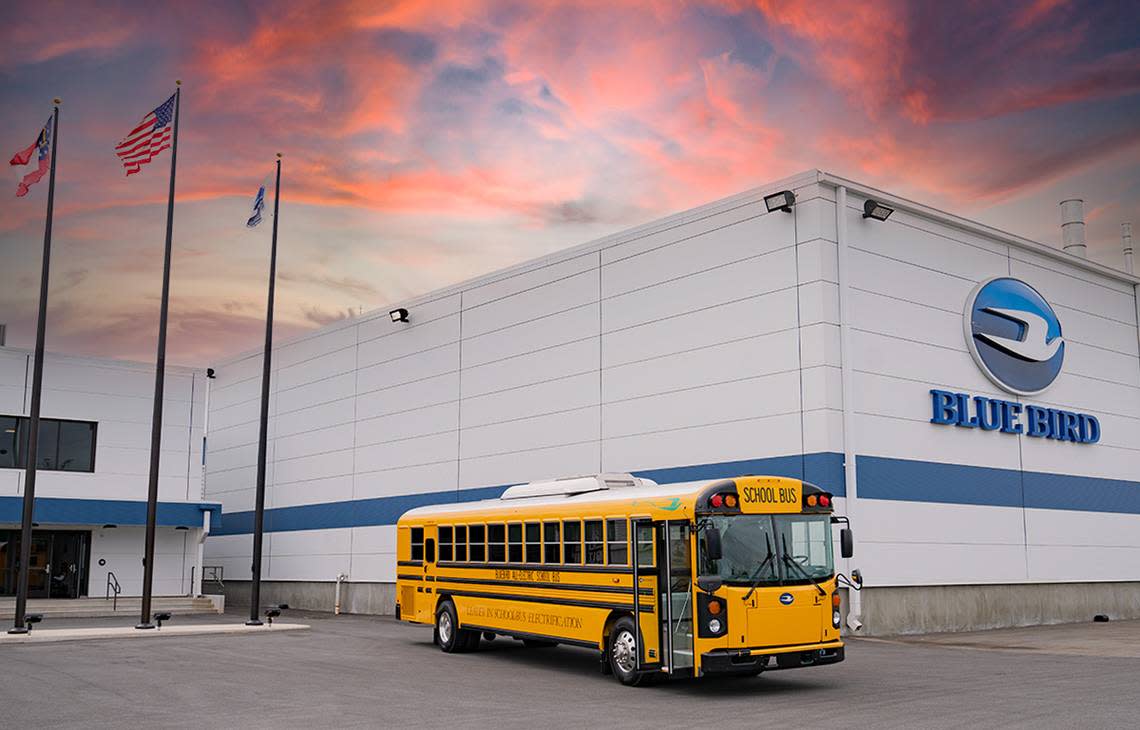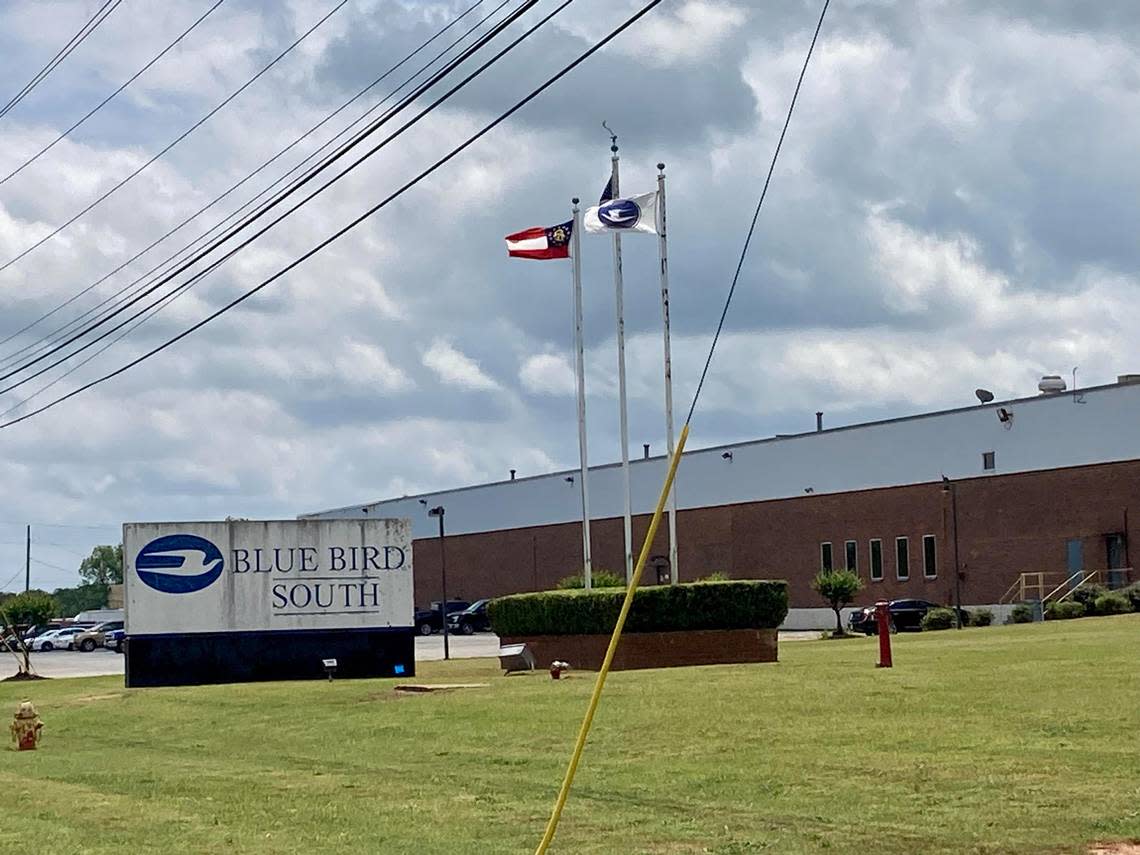Middle GA’s Blue Bird is expecting $1B to build electric buses. Could that be at risk?
On May 12, the CEO of Blue Bird delivered good news to his company’s shareholders.
The company, one of the largest school bus manufacturers in the United States, enjoyed its first profitable quarter in the last year-and-a-half, turning around a period of losses caused by schools ordering fewer buses during the COVID-era shift to remote learning.
Crucial to the company’s recent financial success was a massive program of federal grants for schools nationwide to buy electric buses.
“We have already seen many orders come in through this program and fully expect to garner well over 500 orders for the first phase,” said Matthew Stevenson, the CEO, on the company’s quarterly earnings call. “The long-term impacts of this program will be well over $1 billion in revenue to our organization.”
The same Friday as the earnings call, 1,400 workers at Blue Bird’s factories in Fort Valley voted 697-435 to unionize and affiliate with the United Steelworkers.
By the following Monday, Stevenson had resigned, citing “personal reasons.”
The vote was a watershed moment in Southern labor history and made national headlines — one of the largest industrial shops to unionize in decades. President Joe Biden issued a statement congratulating the Blue Bird workers, who he noted “are building electric school buses that are powering America’s clean energy future, lowering greenhouse gas emissions, and ensuring our kids breathe cleaner air.”
But the EPA grants that financed Blue Bird’s lucrative construction of these electric buses, known as the Clean School Bus Program, came with strings attached — specifically a policy of “union neutrality,” according to which program funds could not be used “to support or oppose union organizing.” It’s too early to know what the fallout of this rule might mean for Blue Bird, but reviews are under way.
Meanwhile, the USW has alleged that Blue Bird actively and even illegally discouraged its workers from unionizing in the runup to the vote.
Union neutrality or union busting?

In seven complaints filed with the National Labor Relations Board, which The Telegraph obtained via a Freedom of Information Act request, the USW alleged that Blue Bird management engaged in the following illegal union-busting tactics:
Fired an employee (whose name the NLRB redacted), in violation of a statute prohibiting discrimination against workers on the basis of pro-union sympathies or activity
Followed workers to an off-site lunch location where they were meeting with union organizers, and surveilled them from a car parked across the street, as well as surveilled them on another occasion
Interrogated employees about their support for the union
Threatened workers with plant closure if they voted to unionize during a mass meeting
Made “coercive statements regarding union dues” and claimed that the union would not represent the workers if they voted for it
Threatened to freeze pay and benefits during the bargaining process, and to drag out bargaining, during a mass anti-union meeting
Threatened that local other employers would not hire workers from the Blue Bird plant if they unionized
Blue Bird did not respond to questions for this article, but the company’s general counsel Ted Scartz previously told The Telegraph’s Becky Purser, “As far as the USW’s charges of unfair labor practices, we do not comment on any specific allegations and will respond to such charges through the appropriate channels with the National Labor Relations Board. Blue Bird does deny that we have had or made any improper or illegal communications with our employees during the current USW organizing campaign.”
Blue Bird workers interviewed by The Telegraph last week as they left the main plant in Fort Valley at the end of their shift said the company made its anti-union position clear.
Aramis Holmes, an employee on the production line, said the company held meetings in which “they were basically saying it’s bad to have (the union) in here, they’re not going to fulfill all their promises, stuff like that. They were trying to persuade us not to vote ‘yes.’”
In one such meeting, he said, workers were told “the plant could be possibly shut down,” and shown a PowerPoint presentation with slides displaying other plants that closed after workers unionized.
Maria Somma, the USW’s organizing director, first began conversations with Blue Bird workers in 2019 — “before the EPA money was offered and before Blue Bird got the EPA money.”
But Somma said she saw the grants — and accompanying union neutrality policy — as a boon, since they enabled union advocates “to point to the employer and say, ‘You’re jeopardizing future investment in this place that you could have,’” thereby perhaps avoiding more heavy-handed union-busting tactics.
The Telegraph asked the EPA whether Blue Bird’s discouragement of the union vote (and alleged illegal union-busting activity) will, if substantiated, result in the loss of further funding.
An EPA spokesperson did not answer the question directly, but said in an email, “It is longstanding federal law that employees have the right to unionize without interference from their employer. President Biden takes this commitment to workers seriously and has directed agencies to ensure federal funds uphold the free and fair choice to join a union. As such, EPA reiterates in the Clean School Bus Program terms and conditions that program funds cannot be used to support or oppose union organizing.”
An action the agency took last month may signal seriousness about its expectations from grant recipients.
In April, the EPA asked the manufacturers that received Clean School Bus Program grants to answer a detailed questionnaire about their labor practices and collective bargaining policies. The manufacturers’ responses will be posted online in June.
Green jobs in red states

The Clean School Bus Program is currently accepting applications for the second of five annual rounds of funding.
In total, the program, which is funded through the Bipartisan Infrastructure Law, will provide up to $5 billion in rebates for school districts to buy electric and low-emission school buses from manufacturers like Blue Bird.
For Craig Corbin, who was on the union’s volunteer organizing committee, building the electric buses “for the kids to ride and be safe on” is a source of pride.
“Since I was young, a little boy, Blue Bird has always been a good bus company, we try to build the best buses in the world,” said Corbin, a Roberta native who joined the company 17 years ago.
School buses are “the largest public fleet” of vehicles in the U.S., with around half a million buses on the road, said Sue Gander, a researcher studying electric school buses at the World Resources Institute, a nonprofit.
This makes school buses an important test case for the Biden administration’s program of federal investment in the transition to electric vehicles and away from fossil fuels.
Electric buses have “half as many greenhouse gas emissions as any other source, and that’s already accounting for the emissions from the electricity grid,” Gander said.
Via the Bipartisan Infrastructure Law, the Inflation Reduction Act, and the CHIPS and Science Act, the Biden administration has funded a domestic manufacturing program geared simultaneously at decarbonizing U.S. energy and transportation, competing with China in strategic sectors, and reshoring factory jobs.
In large part, this manufacturing boom has occurred in Southern states with so-called right-to-work laws (statutes that weaken unions by allowing workers at union-represented workplaces not to pay union dues) in place.
“Lots of, quote, ‘green investment’ is happening in places where workers are not unionized. And that’s why it’s happening there — because that’s more profitable for the companies involved,” said Thea Riofrancos, a political scientist at Providence College studying the energy transition.
This has caused a political headache for a president who frequently boasts of being the “most pro-union president” in American history, and exacerbated a tension between his climate and labor agendas.
The Blue Bird vote stands solidly astride this faultline.
“This is vital for the administration,” Somma said. “They want this economy to run and grow on a clean economy, a green economy — that’s the first and frontline policy. They also support workers and working families — I’ve seen this president and administration go out of their way to say this. You want to combine those initiatives? It’s Blue Bird.”
Jason Walsh, executive director of the Bluegreen Alliance, a coalition of unions and environmental organizations, said the vote should “signal to not just the leadership of Blue Bird, but to the leadership of companies that are now making investment decisions about where to make the technologies of the future, that receive a broad set of incentives in federal legislation, that workers everywhere in this country have a right to unionize, and it is illegal to stand in the way of that right.
“And that if their location decisions are driven by union density or right-to-work-for-less laws, then maybe they should reconsider that calculation.”
Why a union?

Blue Bird was founded in Fort Valley in 1927. It’s been an economic mainstay in Peach County through its 96-year history and employs around 2,000 people today.
Workers interviewed by The Telegraph cited a variety of reasons, from workplace safety issues to inadequate pay and benefits, as motivation for joining the union.
Holmes voted for the union in part because of safety issues caused by a leaky roof.
“When it rains, the floor is wet, so somebody could easily slip and fall, then it’s electrical wires on the floor, somebody could get shocked,” he said.
He also hoped for better pay as a result of union affiliation.
“We’re doing a dangerous job so we should be paid more than $18 for the type of work we’re doing,” he said. “You can get injured, die, all types of stuff. It should be at least $20 or better.”
LaTravis Evans, who works on back doors and fenders, said he has yet to receive a pay raise he was promised, and hoped the union would “just help us, give us what we deserve, just do better than what we are receiving right now.”
For Ivory Petties, another worker, his vote for the union was “just to try something new, other than what’s been going on for the past eight years that I’ve been working here.”
Petties compared the situation to “a wrestling match: you got two opponents; you gotta have a referee in the middle. The employees being on one side and Blue Bird being on the other, the referee is the union.”
Before the vote, Corbin said, “I heard that it’s hard to unionize in the South. ‘It can’t be done. You won’t get it.’ I even heard I’m going to lose my job.”
But his victory gave him confidence that the naysayers were wrong about more than Blue Bird.
“You do it in Fort Valley, you could do it anywhere in the South,” Corbin said. “It can be done.”
